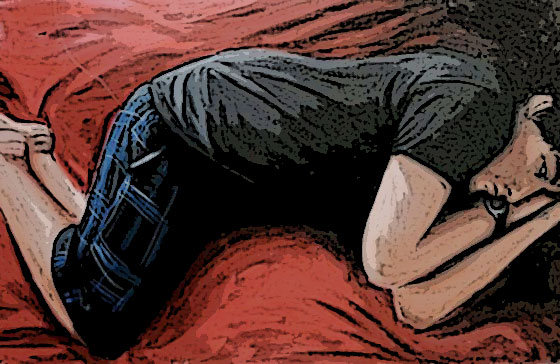Alcohol Withdrawal
Alcohol withdrawal can range from mild to life threatening. Alcohol
withdrawal can also be physical or psychological. Both kinds of
withdrawal send a signal in the form of cravings that the alcohol
dependent person needs to take another drink or face worse symptoms.
 Alcoholic Withdrawing
Alcoholic Withdrawing |
|

Physical Withdrawal
Physical withdrawal can be as mild as simply getting a hangover
or even "the shakes" when one has abstained from drinking
alcohol for a short period-of-time. Other milder physical alcohol
withdrawal symptoms can include the sweats, nausea, headache,
anxiety, a rapid heart beat, and increased blood pressure. Although
these symptoms are uncomfortable and enough to send a chemically
dependent person back into a binge, they are not, of themselves
life threatening.
More serious physical withdrawal symptoms include delirium tremens
or the DT's as many call it. The DT's can include visual and auditory
hallucinations (and even smell) plus profound confusion, disorientation,
hyperactivity, and extreme cardiovascular disturbances. Serious
convulsions, Grand mal seizures, stroke and heart attacks can
also occur, all of which can be life threatening in nature. Once
the DT's begin there is no way to medically treat them.
The good news is that with the help of professional medical treatment,
even the most severe of symptoms can be lessened to a great degree.
One such medical treatment is to substitute Valium for alcohol
and gradually lessen the doses. Milder addiction cases can be
treated with vitamin therapy.

Psychological Withdrawal
Psychological alcohol withdrawal symptoms must also be treated
if an alcohol dependent person is to recover. Alcohol may
be being used by the dependent to self-medicate psychological
or emotions problems. If these underlying problems are not
dealt with in conjunction with a qualified therapist and treatment
program, most likely the dependent will repeat the drinking
and self-medicating behavior.
Many see the psychological symptoms such as the anxiety, depression,
sleep disorders, hallucinations, delusions and others as the only
noteworthy psychological and emotions symptoms. But in a therapeutic
setting, beliefs about alcohol and addiction will need to be explored,
family history analyzed and behaviors challenged. Many therapists
see alcohol abuse as merely a symptom of greater underlying emotional
drama and trauma.
No matter what, though, both types of symptoms will need to be
dealt with in order to offer the alcohol dependent a good chance
at recovery. Alcohol withdrawal needs to take place in a medically
and emotionally safe environment in order to ensure the highest
odds in recovery.
|


